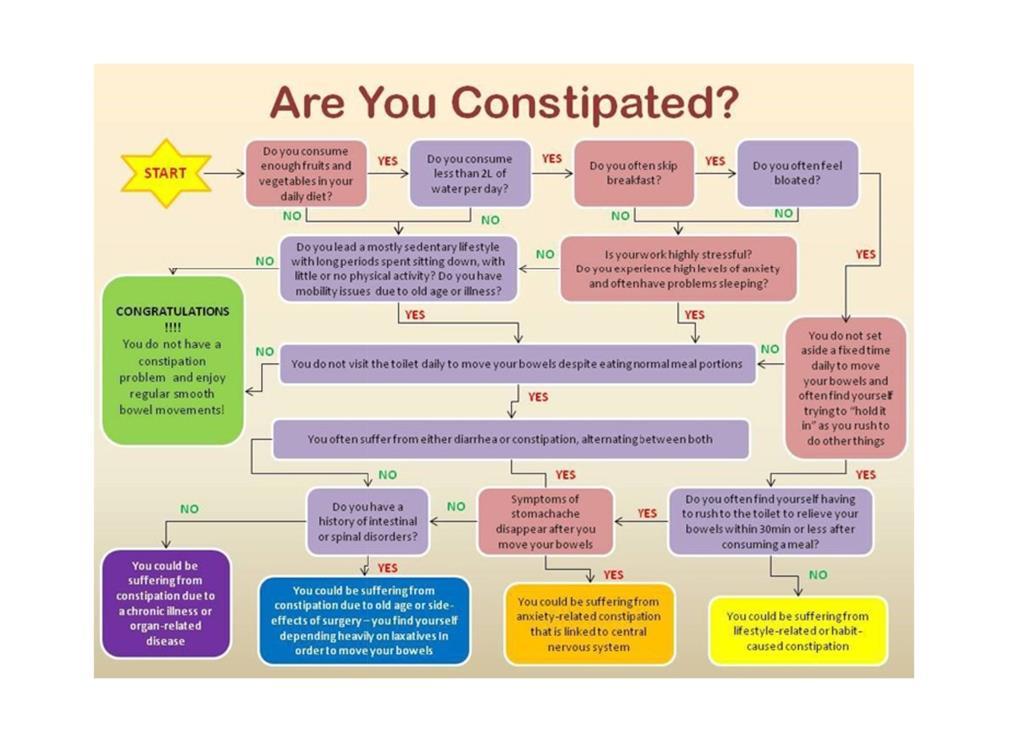Constipation
Constipation:
Constipation refers to bowel movements that are infrequent, e.g., interval between 2 bowel movements is more than 3 days, or hard to pass. Common symptoms are: pain with bowel movements, the sensation of incomplete bowel evacuation, etc.
Impact on health:
The water in the feces will be reabsorbed in gut, leads to hard and rough feces. Second, the feces contain ammonia, hydrogen sulfide, skatoles, secondary bile acids and carcinogens, etc, which may stimulate the enterocytes. Excessive time of feces in gut increases the risks of cancer, hemorrhoids, colonic diseases.
Dietary fiber
Dietary fiber, consists of nondigestible carbohydrates, is known as the 6th nutrient. Generally, the body cannot absorb it and it provides no energy due to its structure (glycosidic linkage).
Types and sources of dietary fiber
1.Insoluble fibers:
- Cellulose: Whole wheat flour, roots, stems, vegetables, etc.
- Hemicellulose: Whole grains, cereals, gluten grains, seaweeds, etc.
- Lignin: The hard stems of plants.
2.Soluble fibers:
- Vegetable gums: aiyu jelly, psyllium, bean gums.
- Pectin: Apples, oranges, bananas, pears, persimmons, pumpkins and potatos.
- Viscous gum: alginates from brown seaweeds
Types and sources of dietary fiber
1.Insoluble fibers:
- Cellulose: Whole wheat flour, roots, stems, vegetables, etc.
- Hemicellulose: Whole grains, cereals, gluten grains, seaweeds, etc.
- Lignin: The hard stems of plants.
2.Soluble fibers:
- Vegetable gums: aiyu jelly, psyllium, bean gums.
- Pectin: Apples, oranges, bananas, pears, persimmons, pumpkins and potatos.
- Viscous gum: alginates from brown seaweeds
Health benefits of dietary fiber
- Providing satiety, and help bowel movements.
- Increase bulk, soften stool, remove stubborn stool.
- Absorb harmful metabolites and carcinogens, shorten transit time through the intestinal tract.
- Bind to bile acids in the small intestine, making them less likely to re-enter the body; this in turn lowers cholesterol levels in the blood.
- Delay absorption of glucose which lowers variance in blood sugar levels.
- As prebiotic fermentable fibers, balance gut microflora.
You should get enough dietary fibers if you are:
- Constipated.
- Office workers, students.
- Unbalanced diets.
- Obese.
- Use of laxatives or sennas.
- Patients with hemorrhoids.
- Unstable blood sugar (hypo- or hyperglycemin), diabetes.
- Poor bowel movement, intestinal polyps.
- Family history of gastric or colon cancer.
- Patients with cardiovascular diseases and hypertesion.

